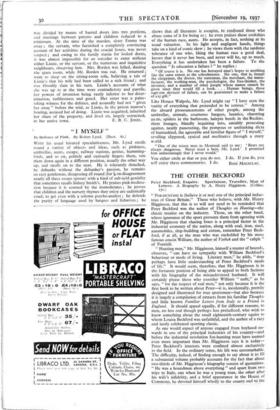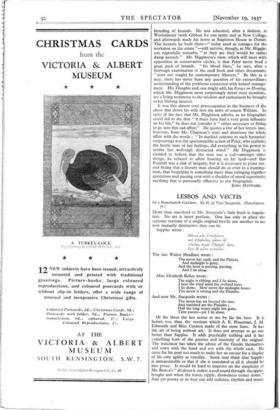THE OTHER BECKFORD
" FOX—HUNTING is (believe it or not) one of the principal indus- tries of Great Britain." Those who believe, with Mr. Henry Higginson, that this is so will not need to be reminded that Peter Beckford was the author of Thoughts on Hunting—the classic treatise on the industry. Those, on the other hand, whose ignorance of the sport prevents them from agreeing with Mr. Higginson that chasing foxes is a principal factor in the industrial economy of the nation, along with coal, iron, steel, automobiles, ship-building and cotton, remember Peter Beck- ford, if at all, as the man who was cuckolded by his more famous cousin William, the author of Vathek and the " caliph " of Fonthill.
" Hunting men," Mr. Higginson, himself a master of hounds, observes, " can have no sympathy with William Beckford's behaviour or mode of living. Literary men," he adds, " May perhaps have little understanding of Peter Beckford's mode of life." It would seem, therefore, that Mr. Higginson is in the fortunate position of being able to appeal to both factions with his biography of the misunderstood husband. It will certainly please those who consider William " unfit," as he says, " for the respect of real men," not only because it is the first book to be written about Peter—it is, incidentally, prettily designed and illustrated for true sportsmen—but also because it is largely a compilation of extracts from his familiar Thoughts and little known Familiar Letters from Italy to a Friend in England. It should appeal equally, if for different reasons, to men, no less real though perhaps less prejudiced, who wish to know something about the small eighteenth-century squire to whom Louisa Beckford was unfaithful, and the author of a racy and justly celebrated sporting classic.
As one would expect of anyone engaged from boyhood on- wards in one of the principal industries of his country—ind before the industrial revolution fox-hunting must have seemed even more important than Mr. Higginson says it is today— Peter Beckford's interests 'were' confined almost exclusively to the field. In the ordinary sense, his life was unremarkable. The difficulty, indeed, of finding enough to say about it to fill a substantial volume probably accounts for the fact that about two-thirds of Mr. Higginson's biography consist of quotations. " He was a houndman above everything " and apart from two trips to Italy, one when he was a young man, the other after his wife's infidelity, and a brief appearance in the House of Commons, he devoted himself wholly to the county and to the _ _ . breeding of. hounds. He was educated, after a fashion, at Weinninster (with Gibbon for one term) and at New College, and afterwards made his home at Stapleton House inDorset. The kennels he built there—" today used as cottages for the workmen on the estate "—still survive, though, as Mr. Higgin- son regretfully remarks, " as they are they -would be rather damp kennels." Mr. Higginson's view, which will meet with opposition in conservative circles, is that Peter never bred a great pack of hounds. " Its blood lines," he says, after a thorough examination of the stud book and other documents, " were not sought by contemporary Masters." Be this as it may, there has never been any question of his extraordinary understanding of the problems connected with kennel manage- ment. His Thoughts and, one might add, his Essays on Hunting, which Mr. Higginson most surprisingly never once mentions, are a living testimony to the wisdom and enthusiasm he brought to his lifelong interest. It was this almost total preoccupation in the business of the chase that drove his wife into the aims of cousin William. In spite of the fact that Mr. Higginson admits, as no biographer could fail to do, that " it must have had a very great influence on his life," he does not consider it " either necessary or fitting to go into this sad affair." He quotes a few of her letters (not, however, from Mr. Chapman's text) and dismisses the whole affair with the words : " In marked contrast to such hysterical outpourings was the sportsmanlike action of Peter, who-realising the hectic state of her feelings, did everything in his power to soothe her well-nigh distracted mind." Mr Higginson is entitled to believe that the man was a cad--amongst other things, he refused to allow hunting on his land—and that Fonthill was a sink of iniquity, but it is necessary to point out, and fitting that a literary man should do so even to a hunting- man, that biography is something more than stringing together quotations and passing over with a shudder of moral superiority anything that is personally offensive to the biographer.
Jomq HAYWARD.

















































































































 Previous page
Previous page